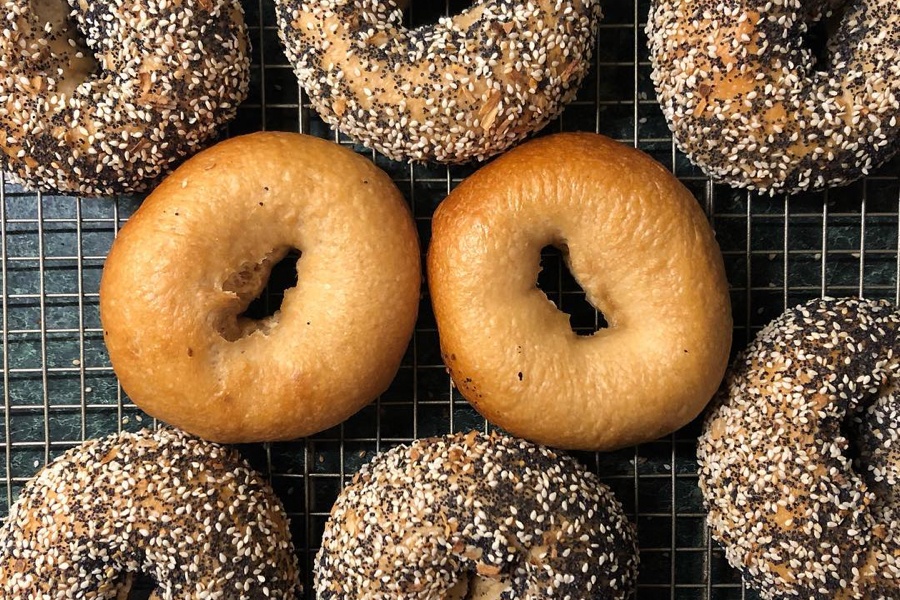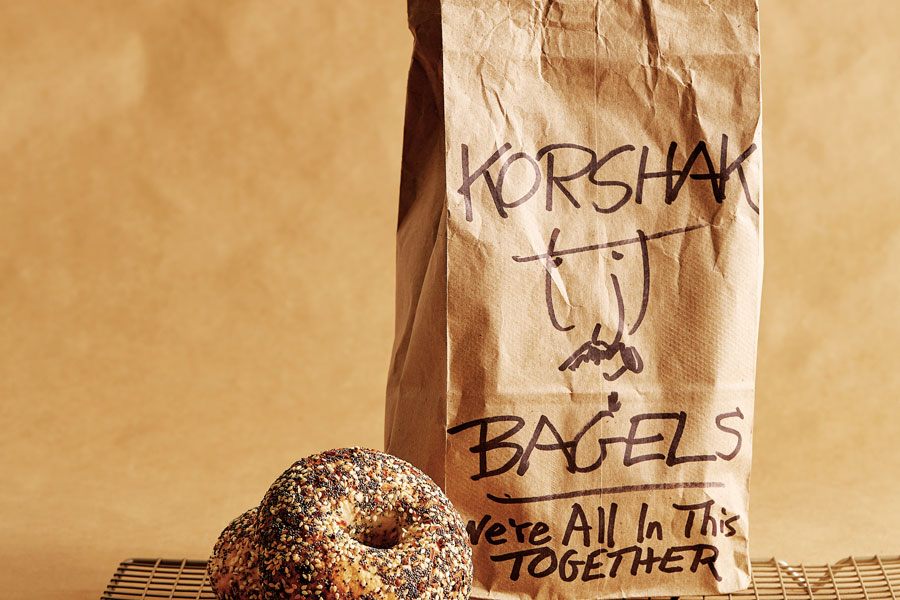The Rise and Fall of Korshak Bagels
Philip Korshak gives us an exclusive interview about labor rights, economics, and the hope that the philosophy behind this bagel-shop experiment influences the restaurant industry.

Philip Korshak outside of Korshak bagels, which announced its closing this week. / Photograph by Colin Lenton
“This story is important to me. I want to put this out there.”
On the phone, Phillip Korshak — the man behind Korshak Bagels, maybe the most famous bagel place in this city that’s never exactly been famous for its bagels — tells me his story. It’s 1970-something. He’s a kid. There’s a war in Vietnam, tear gas in the streets. The world is a mess. And in his neighborhood in Houston, Texas, all the kids are playing guns in the yard.
“They’re playing war, you know? They’re choosing sides. They’re going bang-bang at each other. Only I don’t particularly want to choose sides. I don’t want to go bang-bang at anyone.”
He tells me how his mom — a journalist, an agitator, a punk in 1950s housewife drag — would come out onto the front porch with her iced tea and her cigarette and she’d ask all the little bang-banging neighborhood kids which one of them was playing the conscientious objector. Which one of them was just going to walk away.
And then he pauses. Says, “So anyway, yeah.” And in a breath, he pinballs off onto the next thing and the next and the next: class struggle, labor theory, post-scarcity Utopianism, Marxian economics, death, failure, bagels. Phil is crazy in the best possible way. He’s a philosopher, a poet who would decorate Korshak’s front window (and Instagram feed) with stanzas written in black marker on plain brown paper, a bagelmonger written about in Forbes and Bon Appétit. He thinks a lot. He talks a lot. We’re on the phone for an hour, hour and a half, and I swear it’s the most fun I’ve had in a long time.
So in case you somehow haven’t heard, South Philly’s Korshak Bagels is closing. That’s the news part of this. The little shop with the big lines on the corner of 10th and Morris lasted just under two-and a half years. It opened during the pandemic. It closes on Sunday. And that’s that.
Except, kinda, it’s not.
Because, really, there are two things to mourn here. First, there’s the loss of Korshak’s bagels — the malted-pumpernickel, cinnamon-raisin, French toast with maple butter, and the best salt bagels I might have ever had in my life. They are (or were) very good bagels. Hand-crafted, sourdough-hearted with a long rise and a national reputation and 23,500 followers on Insta.

Korshak’s hand-rolled bagels. / Photograph courtesy of Korshak
Second, there’s the loss of the idea which, somehow, feels even worse.
Korshak Bagels was the front line of a lot of different revolutions in the restaurant industry. Not on the front line, but in a lot of ways, the embodiment of it. In this tiny space on 10th Street, so many things were being attempted, discussed, kicked around, experimented with. Phil paid his staff what he thought was as close to a living wage as he could get — $16 an hour, plus an additional $4 an hour in pooled tips. He tried to schedule compassionately, with every employee getting two days off in a row, and everyone getting at least one weekend day off when it was feasible. He offered paid time off (1.5 hours for every 40 hours worked), which he was still never really satisfied with. “It’s not great,” he told me. “That’s not enough time for a person to live.” But it was the best he could do. Korshak was a union shop. It started hiring in March of 2021, opened in May; and within a month, the crew unionized. And there was maybe no one happier about that than Phillip Korshak, who voluntarily recognized the union.
“It was very, very much a movement of: We are a shop, we should have a union,” Phil says. And when I asked him if he could remember what he said when the staff came to him to say they were unionizing, he tells me, “I believe I said two things: ‘I think I’m going to cry,’ and, ‘I wish my mother was here to see this.’”
And look, the whole Korshak experiment? It was doomed from the start. DOOMED in huge block letters that anyone with half a head for how restaurants run could see from space. Korshak Bagels was just about as successful as any small food operation could hope to be. There were lines every day. They sold out of bagels almost every day. The biggest complaint people had about the place? That the wait was too long because so many people wanted Korshak’s bagels each day that Korshak Bagels was open.
But still, Phil was losing $1,000 a week in payroll. He tells me that he can read numbers as well as anyone, and he knew a year ago that the shop wasn’t going to make it. “A question of economics,” he says. If he’d closed a year ago, he would’ve saved himself $50,000. But he couldn’t. He just couldn’t. This thing? This shop? These bagels? They were his dream. He spent his entire life savings chasing it. And for a long time, he just wouldn’t let it go.
But there are realities here. For starters, Korshak Bagels has never operated at a profit, according to Phil. The shop can sell a thousand bagels a day, sometimes more, but that’s not enough. In the beginning, he worked 3 a.m. to 8 p.m. every day. Now, it’s more like 4 a.m. to 5 p.m., but still. He’s never had a partner at the shop — no one vested the way he is — so it always fell to him to cover shifts when employees called in, when they took time off. He tells me: “Every working human ought to have the right to say, ‘I just can’t today’.” And he believes that. But it’s one thing to say it and quite another to live with the reality of it — which is that in the two and a half years the shop has been open, Phil has had seven days off.
So, he’s walking away. That’s the simple version. He’s just, you know, done. He says that the things he would need to do in order to make Korshak profitable are in direct opposition to the reasons he opened Korshak in the first place. He doesn’t want to automate the production of the dough because producing that dough and making those bagels by hand has been his obsession for 20 years. He doesn’t want to have ordering done through computerized kiosks. Sure, it would save on labor. That’s four people he wouldn’t need anymore, looking after the front, bagging bagels and taking money. But to him, that would be a failure because it would also confirm that the relationship between the customer and the shop is purely material. A constant loop of Give me the thing, give me the money, give me the thing with no personal contact, no moments of connection with the neighbors, no sense of a larger community.
For a long time, maybe for all time, he has been the kid in the neighborhood who wanted out of playing war. He hates the notion of “Us vs. Them” in all its permutations. Labor and management, customer and shop, front-of-house and back-of-house. From the start, the slogan of Korshak Bagels has been “We’re all in this together,” and he means that. So, playing the part of both labor and management, he is calling a permanent strike. He’s walking out on himself rather than see the thing he built become something unrecognizable.

Korshak’s slogan written on a paper bag. / Photograph by Will Figg
And you have to respect that. You just have to. A person that stands by their principles — that believes in something and sees it through to its natural conclusion no matter the cost — is rare. To compromise would mean survival. But it would also mean compromising. And he can’t do that.
There are people who call him a union-buster (which is ridiculous), a hobbyist chased off by the hard work of running a small business (which he’s not), a delicate artist who subsists only on rainbows and daydreams and can’t stand the thought of existing within the confines of this current, cheap and tawdry reality — which, okay, is a little bit true. But Phillip Korshak started this thing and Phillip Korshak gets to decide how it ends. For himself, anyway.
We talk about what he’s doing next – “No idea,” he says. “Until all of this is sewn up, I’m not going to entertain anything” – and for a long time we talk about success and failure. How to define them, and what they mean.
Phil tells me another story. This one is about an airplane. An imaginary airplane, constructed by a group of friends and fellow travelers who don’t really know a lot about building an airplane but who really want to try anyway. Who spend years working on this airplane, doing the best that they can at every step.
One day, it is finally time for the airplane to fly. Everyone who worked on it climbs in, buckles their seatbelts. The plane taxis. It picks up speed. It lifts off. And then it crashes straight into the side of a fucking mountain.
Was that a success or a failure? Ultimately — materially, maybe philosophically — if the airplane won’t fly, it is a failure as an airplane. But Phil doesn’t really believe that. You tried something new when you set out to build the airplane. You met all kinds of people along the way who really cared about building airplanes together, and everyone learned so much about building airplanes in the course of building this airplane that maybe, hopefully, they’ll go on to build bigger, better airplanes elsewhere.
“There are people who are going to sit there and be furious. They’ll say, fuck you for crashing. But no. It was beautiful to see it fly. It was a tremendous victory.”
All restaurants close eventually. Every single one. Just like all people will die (eventually), no restaurant is immortal. What matters is the time you have and what you do with it and what you leave behind.
Korshak Bagels tried to do something ridiculous. It tried to take care of people. It tried to treat everyone well. It made fantastic bagels and, on the side, tried to invent a system that was productive but not exploitative. And everyone involved tried to build their own airplane. They were all in it together.
It crashed, sure.
But for a little while, it was beautiful to see it fly.


